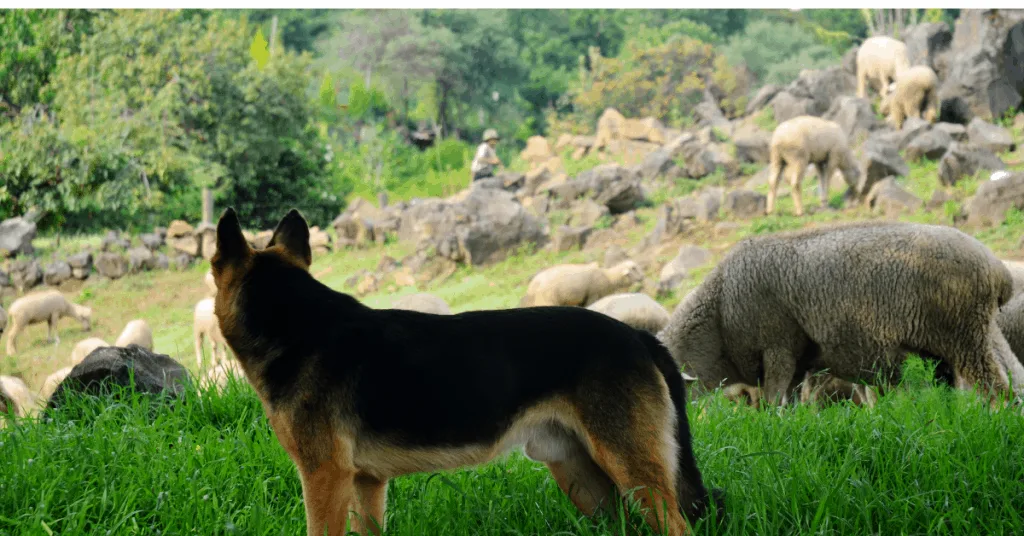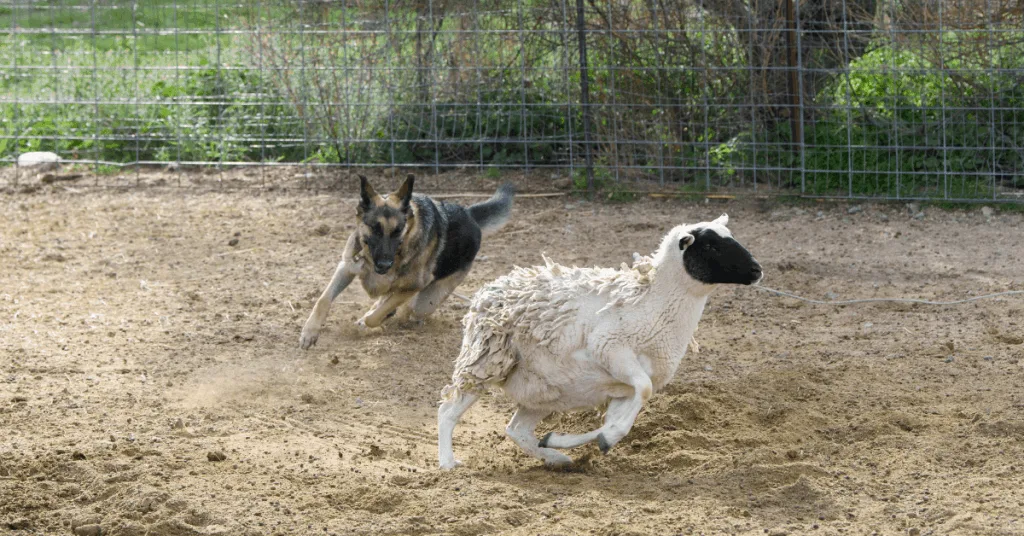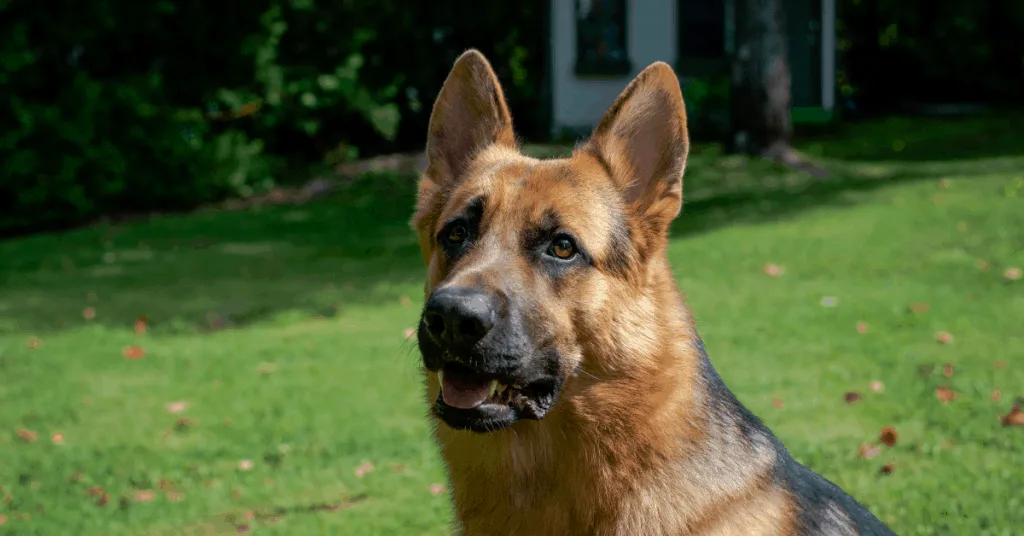
Several centuries ago, Germany served as home to various working farm dogs, including those of livestock guardians.
But what about German Shepherds, do they make good livestock guardian dogs?
German Shepherds are generally not good livestock guardian dogs. This is due to their inherently high prey drive, which sometimes causes them to behave aggressively towards the livestock that they are charged with guarding. Although a properly trained GSD with a mild temperament can do the job, most professionals prefer to use a different breed.
Over the centuries, some of the most versatile dogs have been GSDs—and even more so if their bloodline came from those of a working origin.
Today, many people associate GSDs with those jobs that prove to be more hazardous, such as law enforcement or bomb-sniffing.
Many people do not automatically associate the breed with the job of being that of herding or serving as a guardian for livestock.
However, this is what German Shepherds were originally bred for – herding and guarding sheep and cattle.
Click Here to Jump to a Section
Characteristics to Look for in Choosing a Livestock Guardian Dog
When it comes to dogs that are selected for the guarding and protection of livestock, there are several characteristics that are common to all of them.
These characteristics include:
Low Prey Drive
A livestock guardian dog should not have the disposition to chase down your livestock, even in those instances when the livestock runs from the dog.
Most German Shepherds, because of their high prey drive, are not genetically set up with this trait.
GSDs, along with Border Collies, Australian Shepherds, or any other breed trained to or that has a disposition for herding are not typically the best choices for protecting livestock.
These types of breeds are prone to “working” animals, and as a result, will not leave them alone or at peace.
Large In Size
Most breeds of dogs used for livestock protection typically run in the 90-120 pound range, if not larger.
In some cases, the females of the breed can weigh on the lower end of this estimate. However the males can often top out at well above 150 pounds.
The most common breeds well suited to this role are:
- Anatolian Shepherd
- Komondor
- Great Pyrenees
- Kuvasz
- Tibetan Mastiff
Note of curiosity: Want to see what the best of both worlds looks like? Then check out the German Shepherd Tibetan Mastiff mix.
Protective Coat
A livestock guardian dog needs to have a rough coat of fur.
This will affords a livestock guardian dog the protection they will need when working out in the elements – whether those be rain, cold, snow, or heat.
In this respect, German Shepherds are ideally suited. To find out more about the temperatures that GSDs can tolerate, this article is worth a read:
What Temperatures Can German Shepherds Tolerate?
However, not all livestock guardian dogs are bred for all weather conditions.
For instance, the Anatolian Shepherds were bred in the high desert of Turkey.
As a result, they can tolerate bitter cold, but when it comes to driving rain, they do not do as well.
Assertive and Independent Temperament And Nature
Because most livestock guardian dogs are bred to work both alone and remotely, they should have a somewhat independent and stubborn nature about them.
The perfect livestock guardian dog will be able to set his priorities, decide which area of your property needs to patrolling, and how much distance he needs to keep from the very animals he is being charged to protect.
When a livestock guardian dog is on “the job,” you can expect it to exhibit selective hearing when given commands, as they will handle situations in the manner they see fit.
Training A German Shepherd To Protect Livestock

When most people use the term “protection dog,” it is generally used in a somewhat confused manner.
More often than not, most people have a preset idea or notion as to what the term protection means when used in relation to GSDs.
The term “protection” is often confused with “attack.”
It is essential to keep in mind that a protection dog is not trained in the same manner as a traditional attack dog. The temperaments required for each type of job are very different in nature.
The primary training for a guard dog is that of alerting its owners to the possible intrusion of strangers.
Whereas an attack dog is trained to not only attack when commanded but also cease the attack when instructed.
A GSD trained as a protection dog will combine both of these mannerisms and use his own judgment when discerning a threatening situation and determining how to react.
GSDs are innately smart, independent thinkers, which makes them the expert guard dogs that they are.
Their breeding and herding heritage create a combination that proves them to be a common choice for protecting people, property, and, on some occasions, livestock.
It is important once again to highlight that German Shepherds possess an innately high prey drive, so any application of protecting livestock requires disciplined training.
Training a German Shepherd to Protect Livestock

The majority of livestock guardian dogs can be trained to protect children, ducks, chickens – just about anything.
However, again, a GSD needs to be properly trained and shown what he needs to protect.
If just thrown into a situation without any guidance, a GSD will pick and choose what to protect on his own, which is not necessarily the same animals that are important to the owner of the livestock.
However, once a GSD is shown what to protect, he will make it his job to keep the animals safe, even if it means giving his own life in the process in order to get the job done.
But remember, if a GSD livestock guardian has too much of a prey drive in his DNA, then no matter how much training he is given, he will never be manageable for the work.
Aggressive Versus Dominant
Two more words, in the context of GSDs, that are completely different in meaning and definition, but often confused, are “aggressive” and “dominant.”
Dominance in any animal is the driving desire to be at the very top of the pecking order. In other words – top dog.
A dog with a dominant temperament wants to be the alpha of the pack, whether that pack consists of other canines, a human family, or a flock of chickens.
It doesn’t matter what the species is; a dominant dog will want to have first rights to everything – food, the water, where to sleep, where to walk, or even where to stand.
Aggression is an entirely different trait.
It presents with the desire to inflict pain and damage, no matter what the reason may be.
Whether aggression is brought on by fear, or the guarding and protecting food, it is almost assured that some form of bodily damage is likely to occur.
Eventually, in any group or pack of dogs, it will come into question who is the most dominant and, therefore, alpha.
With this in mind, a livestock GSD will only show real aggression when those animals that are in his charge to protect are threatened in some way or manner.
If this occurs, a GSD will snap into protective mode, and as a result, will show aggressive behavior.
With this said, there are a few specific questions about your livestock that need to be addressed before letting your GSD loose to do his job.
The type of animal that a GSD is charged with guard is a determinant of how effective the guarding will be, so we will now take a closer look at what animals GSDs should and shouldn’t be given the job of protecting.
Is a German Shepherd a Good Livestock Guardian of Chickens?
The answer is yes, but with several points to keep in mind.
Although most German Shepherd dogs do possess an inherent prey drive that may entice them to chase and capture your chickens, they can prove suitable protectors with the proper training and patience.
Roosters and GSDs are not always the best match, as the dominance and aggression common to most roosters is viewed as a challenge by a GSD.
You can imagine who will win that battle!
Is a German Shepherd a Good Livestock Guardian of Goats?
The use of a GSD for guarding or protecting goats can be tricky.
Many people have had good luck with the use of a GSD for guarding goats, but for the most part, they are not suggested for this type of job.
We have learned of several accounts where owners of sheep find that a GSD put in charge of protecting them does the job with too much aggression – at times nipping a bit too hard at the goats.
This is because goats tend to be somewhat stubborn, a characteristic that a GSD may view as a challenge.
And it is well known that a German Shepherd will not back down from a challenge – especially a GSD trained to protect.
Is a German Shepherd a Good Livestock Guardian of Sheep?
Sheep are animals that needs to be herded and directed, a GSD does this job very well.
As previously mentioned, German Shepherds were originally bred to herd and guard sheep and cattle, so guarding and protecting sheep is literally in a German Shepherd’s DNA.
Just take a look at these German Shepherds tending to a flock of 60 sheep to get a better idea of how effective they can be in this role:
Similar to the situation with goats, some owners of livestock to state that GSDs can get a little nippy when it comes to sheep, but all in all, they are very well suited to this role.
Is a German Shepherd a Good Livestock Guardian of Cows?
The answer here is a resounding “yes!”
This is what German Shepherds were originally bred for. Their drive to herd makes them highly sought after for this job.
Cows tend to get confused and easily spooked when in herds, especially when the herds are large.
This is where a GSD will excel – they instinctively know how to round up cows and keep them in order.
Is a German Shepherd a Good Livestock Guardian of Horses?
Overall, GSDs make fine horse guardians, and we have often seen German Shepherds bonding closely with horses.
In fact, many horse owners feel that having a GSD on the trail with them is invaluable.
There are numerous accounts of German Shepherds running interference between horses and predators, including cougars and bears!
However, please be mindful that a GSD will need proper training around horses so that he does not attempt to herd them.
This can work very easily to spook a horse and potentially throw off the rider.
Is a German Shepherd a Good Livestock Guardian of Ducks?
As with chickens, you will need to train your GSD not to attack your ducks, but rather to protect them.
Once you have successfully conditioned your GSD to resist their natural prey drive, many people have stated that they the breed is a superb protector of ducks.
Fun fact: It is not uncommon for a GSD around ducks to herd duckings!
Final Thoughts
While German Shepherds are not ideal livestock guardians in comparison to certain other breeds, their role should not be discounted.
As stated above, the livestock guarding efficacy of a GSD will depend on the type of animal a GSD is charged with protecting and how well the GSD is trained to perform the job.
Even though GSDs have a somewhat innate predisposition for guarding when it comes to protecting livestock, you may find that some adaptive training may be in order due to their high prey drive.
As a result, with patience and perseverance in training, you will have a livestock guardian that you can more than rely on to put his life on the line to come between your livestock and any potential threat.
